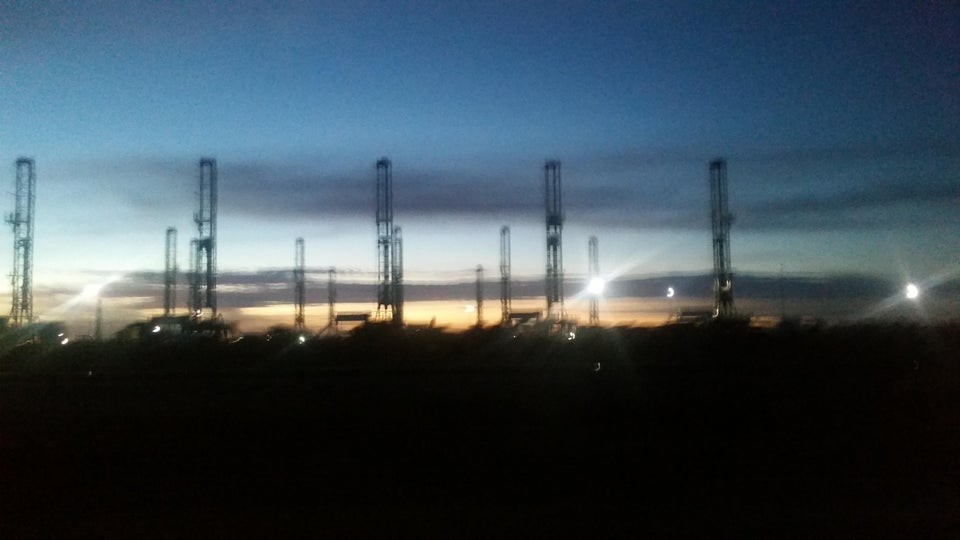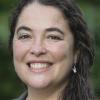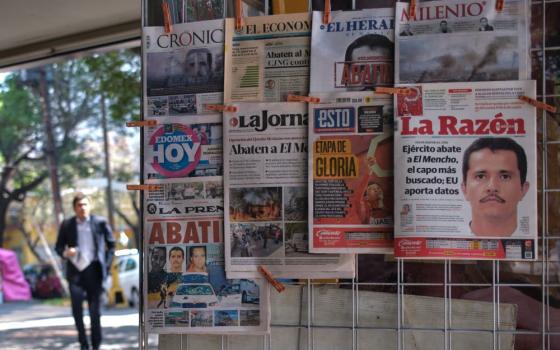
Drilling rigs park in the Permian Basin outside Odessa, Texas. (Wikimedia Commons/CC Share Alike 4.0/Lazarus1255)
An early morning drive for Maria Treviño takes on a different meaning. She prepares to drive seven hours from her base in Laredo, Texas, to the Permian Basin, the world's largest oil and gas shale region. "I travel in and out of the Permian Basin and can tell the significant difference." she said. She's referring to the constant smell of petrol production in the air and the water pollution linked to fracking.
"I have talked to people who got very sick upon moving to the Permian Basin. Eventually, they get used to the smell, the water and focus on a very good paying job," Treviño added.
For many Latinos that relocate to the Odessa-Midland, Texas, communities, the financial security comes at a very high cost. The Permian Basin is the world's top polluter, according to a 2022 United Nations-sponsored survey. Exposure to the pollution there has been linked to cardiovascular and pulmonary diseases and premature death.
Treviño traveled to the Permian Basin several times during the month, filled with determination and faith. "The Permian Basin is my biggest challenge," she said. "While it is not easy, by God's grace and with the guidance of the Holy Spirit, we will have transformation."
Treviño is the Texas program coordinator for the Laudato Si' Movement. During her three-year tenure, Treviño facilitated the conversion and implementation of the theological building blocks provided by Laudato Si', Pope Francis' 2015 encyclical focusing on care for the environment. Treviño, moved by the Holy Spirit, worked in a grassroots approach with the archdioceses of San Antonio, Austin and El Paso, Texas, to embrace the Laudato Si Action Platform.
"We have significant movement in Houston, and now, I need to ignite the spark at the Premium Basin," Treviño said.
The strategy Treviño followed focuses on her relationship with the Latino community in the Lone Star State and establishing strategic alliances with Latinas within the individual church settings. In Texas, Latinos make up the biggest ethnic group. El Paso, Austin and San Antonio are the cities with the highest percentage of Latinos, and Catholic Latinos make up the largest religious group in the state.
Through cold calls and surprise visits, Treviño found pushback from church staff members due to ignorance and their lack of understanding about the papal encyclical and the Laudato Si' Movement. Determined, Treviño began to look for the wisdom figures in parish life.
"For the most part, the wisdom figures tend to be religious women and long-time community members," she said. "The religious women with whom I speak are familiar with Laudato Si’ and welcome me to their parish, introduce me to the key Latina leaders, and allow me to lead a spiritual retreat or begin the educational process."
Treviño said that once she can engage in the community; she can work with the Latina leaders, who become instrumental in educating, preaching and leading the eco-theological transformation.
"I find that the top-down approach does not work. In my three years of experience, working with individual parishes, growing the footprint, and then engaging the diocese is most effective," she added.
Treviño targets Latinas as the premier group to educate on the theological framework of Laudato Si'. In her experience, the Latinas are actively engaged in their communities, tend to be strong opinion leaders and are motivated for the good of the community.
Once Treviño can identify the Latinas open to a conversion of heart and bring their full essence to the Laudato Si' experience, she proceeds to educate and certify them as Laudato Si' animators. The certification creates accountability to share and actively engage in the theological foundation of Laudato Si'. The Latina leaders can integrate the insight into the parish life.
In her three years as coordinator and educator for animators, Treviño said, each Latino parish has strategic Latina wisdom figures that are pillars of the community. Being able to connect with the Latina wisdom figure creates trust and allows other Latino parishioners to embrace the Laudato Si' Movement.
Advertisement
The movement, founded in 2015, the unison of the Paris Agreement and Laudato Si', aims to educate and motivate the Catholic community to care for our common home and work toward climate and ecological justice. Animators propel the program forward.
While mindful practices of Laudato Si' in the United States are scarce, faith communities are engaging in programs propelled by the Laudato Si' Movement and the Laudato Si' Action Platform.
But Treviño remains confident in the slow and steady process. "It starts with a conversion of the heart and following a spiritual awakening that propels actions and behavioral changes," she said,
Laudato Si' highlights the theological interconnectedness between creation and the triune God, as found within Scripture, and essential to the communal life of the church. The invitation of the papal document extends beyond theological theory and calls for the faithful to see, judge and act to engage in a loving relationship with God through the gift of creation. Latinas within the parish center and as integral members of the church are in a strategic position to organize and empower their local communities through spiritual education on eco-theological practices. Latinas, as pillars of their parish life, can interpret Scripture using the theology of creation and cultural richness to implement programming in faith formation and the diverse spiritual components of parish life.
Treviño accepted the challenge to apply a grassroots organizing approach to reach individual parishes and plant the seeds of Laudato Si'. Challenges include reaching out to parishes that receive donations from the petroleum industry. Many of the Latinos that Treviño interacts with work directly or indirectly with the petroleum industry and can be apprehensive about the information shared.
"Some of the Latinos that I work with shared that at first the strong smell in the air used to make them sick," she said.
"Eventually, with time, they got used to the omnipresent smell of petrol and ignored the oil in the water and the fact that the pollution in their communities would make them sick. Then, from a theological lens, we shed light on the harms to creation and the community. This is a matter of faith and justice."
While Treviño hopes to count on the support of the Midland-Odessa region, she is happy to count on 39 certified animators. Slowly, she is reaching out to Latino communities and counting on the support of Latinas to create an eco-theological transformation.





